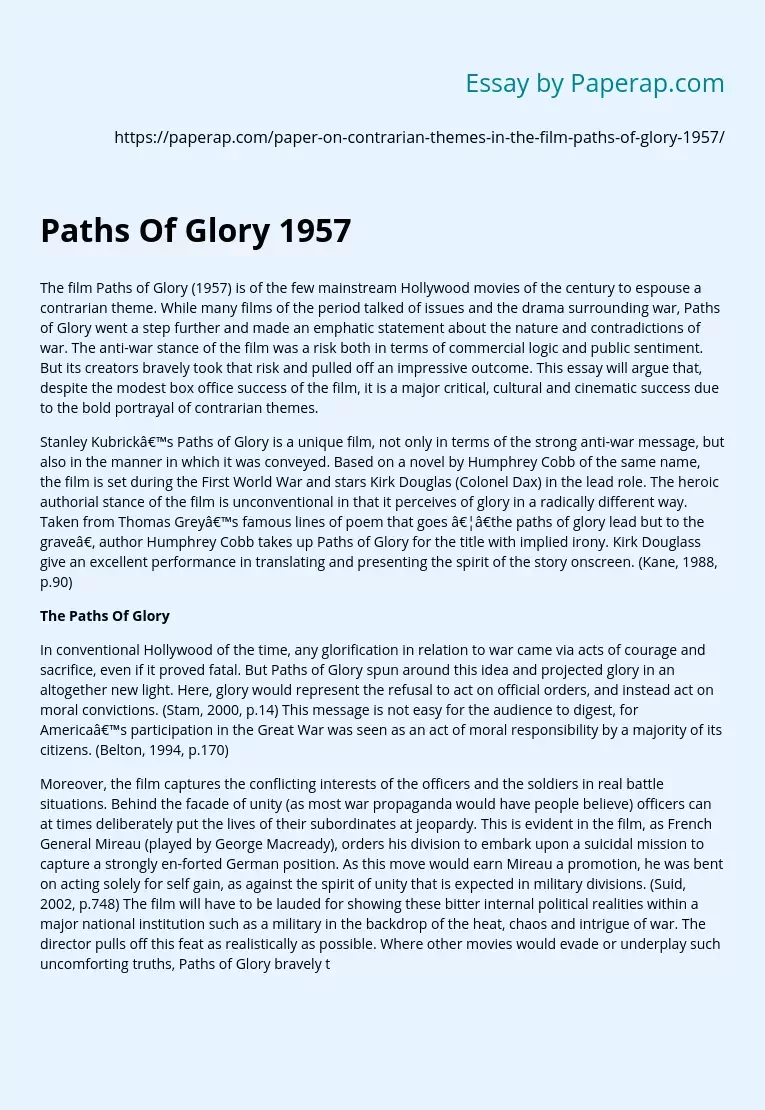Paths Of Glory 1957
The film Paths of Glory (1957) is of the few mainstream Hollywood movies of the century to espouse a contrarian theme. While many films of the period talked of issues and the drama surrounding war, Paths of Glory went a step further and made an emphatic statement about the nature and contradictions of war. The anti-war stance of the film was a risk both in terms of commercial logic and public sentiment. But its creators bravely took that risk and pulled off an impressive outcome.
This essay will argue that, despite the modest box office success of the film, it is a major critical, cultural and cinematic success due to the bold portrayal of contrarian themes.
Stanley Kubrick’s Paths of Glory is a unique film, not only in terms of the strong anti-war message, but also in the manner in which it was conveyed. Based on a novel by Humphrey Cobb of the same name, the film is set during the First World War and stars Kirk Douglas (Colonel Dax) in the lead role.
The heroic authorial stance of the film is unconventional in that it perceives of glory in a radically different way. Taken from Thomas Grey’s famous lines of poem that goes …”the paths of glory lead but to the grave”, author Humphrey Cobb takes up Paths of Glory for the title with implied irony. Kirk Douglass give an excellent performance in translating and presenting the spirit of the story onscreen. (Kane, 1988, p.90)
The Paths Of Glory
In conventional Hollywood of the time, any glorification in relation to war came via acts of courage and sacrifice, even if it proved fatal.
But Paths of Glory spun around this idea and projected glory in an altogether new light. Here, glory would represent the refusal to act on official orders, and instead act on moral convictions. (Stam, 2000, p.14) This message is not easy for the audience to digest, for America’s participation in the Great War was seen as an act of moral responsibility by a majority of its citizens. (Belton, 1994, p.170)
Moreover, the film captures the conflicting interests of the officers and the soldiers in real battle situations. Behind the facade of unity (as most war propaganda would have people believe) officers can at times deliberately put the lives of their subordinates at jeopardy. This is evident in the film, as French General Mireau (played by George Macready), orders his division to embark upon a suicidal mission to capture a strongly en-forted German position. As this move would earn Mireau a promotion, he was bent on acting solely for self gain, as against the spirit of unity that is expected in military divisions. (Suid, 2002, p.748) The film will have to be lauded for showing these bitter internal political realities within a major national institution such as a military in the backdrop of the heat, chaos and intrigue of war. The director pulls off this feat as realistically as possible. Where other movies would evade or underplay such uncomforting truths, Paths of Glory bravely took on a commitment to ground realities. (Altman, 1999, p.14)
Colonel Dax (played by Kirk Douglas) is the hero of the film, as he sees to protecting soldiers under his charge from the selfish designs of General Mireau. As a way of deflecting blame from himself, Mireau orders the Court Martial of 100 of his soldiers (later reduced to 3) for cowardice and refusal to obey orders. It is at this juncture that the denouement of the film unfolds, as Colonel Dax (who served as a civilian lawyer prior to his military engagement) takes up the cause of the hapless soldiers and defends their case. Director Stanley Kubrick makes yet another bold statement via his realistic portrayal of the dynamics of power. Although Court Martial are supposed to conform to commonly accepted principles of jurisprudence, fairness, justice and due process of law, in the case the three unfortunate soldiers who are sentenced to death (essentially summarily after the farcical ‘trial’). (Clarke, 2006, p.112)
Hence, in conclusion, Paths of Glory is satisfactory in terms of aesthetics, screenplay, dialogue and story. But where it excels most is in the unconventional thematic elements it incorporates. It also excels in giving new meanings and interpretations to the concept of ‘glory’ in war. It’s contrarian view of glory, largely showcased through the character of Colonel Dax, leaves a lasting impression on the discerning and thoughtful viewer.
Works Cited:
Primary Resource:
Directed by Stanley Kubrick, Paths of Glory (1957), Bryna Productions, Distributed by United Artists, United States.
Secondary Resources:
Altman, Rick. Film/Genre . BFI Publishing (1999). ISBN 0-85170-717-3; ISBN 978-0-85170-717-4
Belton, John. American Cinema/American Culture. New York: McGraw-Hill, 1994, pp. 165-171, ISBN 978-0070044661.
Kane, Kathryn. “The World War II Combat Film”. In: Wes D. Gehring (ed.) Handbook of American Film Genres. New York: Greenwood Press, 1988, pp. 90-91, ISBN 978-0313247156.
Clarke, James (2006). War Films. Virgin Books. ISBN 9780753510940
Grant, Barry Keith. Film Genre: From Iconography to Ideology. Wallflower Press: 2007.
Suid, Lawrence (2002). Guts & Glory: The Making of the American Military Image in Film (2 ed.). University Press of Kentucky. pp. 748.ISBN 0813190185, 978-0813190181. Retrieved 2/12/2009.
Stam, Robert. Film Theory: An Introduction. Malde, MA: Wiley-Blackwell, 2000. 14
Paths Of Glory 1957. (2019, Dec 05). Retrieved from https://paperap.com/paper-on-contrarian-themes-in-the-film-paths-of-glory-1957/

